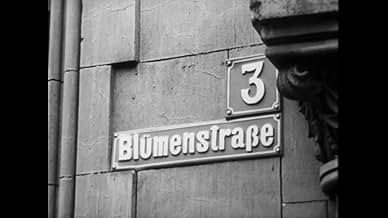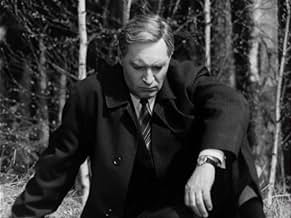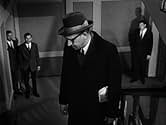PUNTUACIÓN EN IMDb
8,7/10
5,3 mil
TU PUNTUACIÓN
Añade un argumento en tu idiomaDuring World War II, a Soviet undercover spy manages to infiltrate the Nazi elite.During World War II, a Soviet undercover spy manages to infiltrate the Nazi elite.During World War II, a Soviet undercover spy manages to infiltrate the Nazi elite.
Explorar episodios
Reseñas destacadas
10Yuri-8
One of the little-recognized deficiencies of spy movies is that 'action'--chases, shootings, explosions, etc.--is dominant content. Of course, the trend caters to modern audiences that are addicted to sound and special effects. However, action-driven spy movies (e.g., James Bond) suffer from 3 major defects: 1)They are not believable 2)They contain little or no acting performances to speak of 3)As such, they are easily forgettable. This is not the case with "17 moments of spring" (hereafter SMOS)
The 12 episodes of the series have been specifically shot in Black and White, in fairly simple studio sets, with no special visual effects. What makes SMOS the favorite of audiences, is a gamut of absolutely incredible acting. Each role, even a minor one, casts an "all-star" Soviet actor, and they deliver deep psychological performances. Tikhonov is an obvious star as Stierlitz, but consider Leonid Bronevoy as Mueller, the friendly, always suspicious and incredibly cruel inside Gestapo chief. Or Oleg Tabakov, as cheerful Schellenberg of the German intelligence. Or Plyatt as very vulnerable and very human Pastor Schlag who nevertheless embodies the power of the Church.
So essentially SMOS is not a spy movie, but a tight psychological drama. But we must not forget the subject, and it is an important one, based on a major real life event: in early 1945, trying to finish off the Nazi Germany, the Russians found out that SS-gruppenfuehrer Karl Wolff (essentially a representative of the odious Himmler) attempted to negotiate a separate piece with the Americans in Italy. The talks were top-secret (OSS star Allen Dulles was the US negotiator) and essentially meant a betrayal of Russia by its anti-Nazi allies. SMOS is about how the Russians discovered the secret and forced the end to negotiations.
In short, this is one of the greatest all-time spy thrillers. Just as "Rosemary's Baby" is arguably the best horror movie because of its acting and directing, so does SMOS shine through the mediocrity we are fed today. I wish it were shown to the wide Western audiences, so that they can see for themselves!
The 12 episodes of the series have been specifically shot in Black and White, in fairly simple studio sets, with no special visual effects. What makes SMOS the favorite of audiences, is a gamut of absolutely incredible acting. Each role, even a minor one, casts an "all-star" Soviet actor, and they deliver deep psychological performances. Tikhonov is an obvious star as Stierlitz, but consider Leonid Bronevoy as Mueller, the friendly, always suspicious and incredibly cruel inside Gestapo chief. Or Oleg Tabakov, as cheerful Schellenberg of the German intelligence. Or Plyatt as very vulnerable and very human Pastor Schlag who nevertheless embodies the power of the Church.
So essentially SMOS is not a spy movie, but a tight psychological drama. But we must not forget the subject, and it is an important one, based on a major real life event: in early 1945, trying to finish off the Nazi Germany, the Russians found out that SS-gruppenfuehrer Karl Wolff (essentially a representative of the odious Himmler) attempted to negotiate a separate piece with the Americans in Italy. The talks were top-secret (OSS star Allen Dulles was the US negotiator) and essentially meant a betrayal of Russia by its anti-Nazi allies. SMOS is about how the Russians discovered the secret and forced the end to negotiations.
In short, this is one of the greatest all-time spy thrillers. Just as "Rosemary's Baby" is arguably the best horror movie because of its acting and directing, so does SMOS shine through the mediocrity we are fed today. I wish it were shown to the wide Western audiences, so that they can see for themselves!
9mizb
Made in black-white as most TV receivers in Soviet block in the 1970's were black and white.
The story covers last weeks of existence of Hitler's Reich and some attempts of SS generals to conclude a separate armistice with USA and UK. The SS colonel Stirlitz is a Russian spy trying to prevent it. Some front combat scenes are shown as intermezzos. Although the war was finished more than 60 years ago, we still do not know all its details and secrets. Maybe, some German leaders tried to break the coalition between Anglo-Saxon powers and Russia. But the range of Soviet infiltration of central entities of 3rd Reich (like RSHA, General Staff or NSDAP Chancellory) has not been fully explained so far.
Anyway, this is a very interesting film to watch.
The story covers last weeks of existence of Hitler's Reich and some attempts of SS generals to conclude a separate armistice with USA and UK. The SS colonel Stirlitz is a Russian spy trying to prevent it. Some front combat scenes are shown as intermezzos. Although the war was finished more than 60 years ago, we still do not know all its details and secrets. Maybe, some German leaders tried to break the coalition between Anglo-Saxon powers and Russia. But the range of Soviet infiltration of central entities of 3rd Reich (like RSHA, General Staff or NSDAP Chancellory) has not been fully explained so far.
Anyway, this is a very interesting film to watch.
10lowway
One of the best films of Soviet Union. It is not about intrigues and spy games, though the plot is really gripping. Last months of WW II. Shtirliz - Soviet resident is under suspection of Gestapo. Being in the heart of Hitler's sistem, he struggled with hazi regime long years. The Third Reich bosses Himmler, Shellenberg, Wolf understand that their game is over, they try to save their own skin and seek for separate peace with USA and Great Britain. This treaty could be big calamity for Soviet people, and USSR secret service breakes ignouble plans of nazi. The famouse Soviet actor Vyacheslav Tikhonov (Prince Andej in "War and peace" by Bondarchuk) have excellent incarnated the interesting and very complicated character of Shtirliz. All other roles were played by the best actors of Soviet screen.
Some parts of film were shot in GDR. For the first time after WW II in Soviet cinema appeared the German soldier character, who was kind and humane person. Gestapo guard Helmut saved Russian secret service woman Katya with her child, but himself perished. This role was brillant played by GDR actor Otto Mellies.
"Seventeen moments of spring" is about people, who were cut off their home, country, families in order to fighting with nazi criminals.
Some parts of film were shot in GDR. For the first time after WW II in Soviet cinema appeared the German soldier character, who was kind and humane person. Gestapo guard Helmut saved Russian secret service woman Katya with her child, but himself perished. This role was brillant played by GDR actor Otto Mellies.
"Seventeen moments of spring" is about people, who were cut off their home, country, families in order to fighting with nazi criminals.
Well, I thought this was a fantastic production - very engrossing, with excellent performances, artistic direction, and intelligent scripts. It's a great example of how a television mini-series, as a format, can bring a novelistic type of depth of story and character to the screen. And it's easy to see why it's still so iconic in Russia.
By any technical definition, this particular series is propaganda -- it was ordered specifically by the Soviet government in order to interest more young people in the spy service. Any maybe it did. But "Seventeen Moments of Spring" acts in a way that's completely opposite to the propaganda usually works. Instead of simplifying issues and making them into easy black-and-white decisions, this series complicates them -- dwelling on the difficulty of the heroes' decisions, and taking care to imbue the Geramans with more humanity rather than less.
It's notable and, I think, key to the series' success that the centerpiece of each episode consists of one or two long, tense, subtle dialogue-heavy scenes. The contrast of the action-oriented expectations from the subject of spies and war with the tense character drama that we see is excellent.
The integration of real footage from the war and cameos from other major players are really well-apportioned, and give the character scenes that we're watching more importance to us for our having been reminded of their contextual importance.
The music is about perfect as well, helping to set the tone. In all, it's a spy drama who main modes are subtle, thoughtful melancholy in the foreground, with the element of constant danger tinging it from the background. In that, it's tone is unexpected and very successful. More than worth watching, even for those who don't normally go in for war or spy films.
By any technical definition, this particular series is propaganda -- it was ordered specifically by the Soviet government in order to interest more young people in the spy service. Any maybe it did. But "Seventeen Moments of Spring" acts in a way that's completely opposite to the propaganda usually works. Instead of simplifying issues and making them into easy black-and-white decisions, this series complicates them -- dwelling on the difficulty of the heroes' decisions, and taking care to imbue the Geramans with more humanity rather than less.
It's notable and, I think, key to the series' success that the centerpiece of each episode consists of one or two long, tense, subtle dialogue-heavy scenes. The contrast of the action-oriented expectations from the subject of spies and war with the tense character drama that we see is excellent.
The integration of real footage from the war and cameos from other major players are really well-apportioned, and give the character scenes that we're watching more importance to us for our having been reminded of their contextual importance.
The music is about perfect as well, helping to set the tone. In all, it's a spy drama who main modes are subtle, thoughtful melancholy in the foreground, with the element of constant danger tinging it from the background. In that, it's tone is unexpected and very successful. More than worth watching, even for those who don't normally go in for war or spy films.
10sunlion
This series are far greater than anything that has been filmed about war ever. It shows closely characters of German Nazi top during the last weeks of the war, when they understand that the war is lost. A Russian spy is working among them speeding up the war's end.
The pace of the film is slow and thorough, the movie is meant for people with ability to analyze, reflect. Characters of the people involved are depicted are so lively that the film fuses with the documentary pieces. Acting is extremely raw and natural, it actually in't acting, it's living. Tihonov in a role of Stirlitz portrays a real spy - brilliantly talented, sharp, calm, cold, patient - everything that areal spy has to be. At the same time he is not a greedy adventurous coat-turner, he works for his country, his people, his family. And the last - this film works as a litmus test on people. If you don't understand it you simply haven't matured for it. The film itself is flawless.
The pace of the film is slow and thorough, the movie is meant for people with ability to analyze, reflect. Characters of the people involved are depicted are so lively that the film fuses with the documentary pieces. Acting is extremely raw and natural, it actually in't acting, it's living. Tihonov in a role of Stirlitz portrays a real spy - brilliantly talented, sharp, calm, cold, patient - everything that areal spy has to be. At the same time he is not a greedy adventurous coat-turner, he works for his country, his people, his family. And the last - this film works as a litmus test on people. If you don't understand it you simply haven't matured for it. The film itself is flawless.
¿Sabías que...?
- CuriosidadesThe person responsible for extras casting was Jewish and was casting a lot of his friends and relatives in tiny parts. As a result, when the military consultant (from the KGB) saw the chosen actors, he said that most of the guards at Nazi headquarters looked like soldiers of Israeli army, not elite SS soldiers, and demanded that they change them to more appropriate looking actors. As a result, the roles of SS guards were played by military cadets of the frontier-guards schools from Tallinn (Estonia) and Riga (Latvia), who, being tall, blonde and blue-eyed looked more like real SS soldiers.
- PifiasThe reels on the tape decks often have too much tape to be held by the reels.
- Citas
Heinrich Mueller: These days you can not believe anybody. Even yourself. You can believe me, though.
- ConexionesFeatured in Nie ma rózy bez ognia (1974)
- Banda sonoraMgnoveniya
(uncredited)
Music by Mikael Tariverdiev (uncredited)
Lyrics by Robert Rozhdestvensky
Performed by Iosif Kobzon (uncredited)
Selecciones populares
Inicia sesión para calificar y añadir a tu lista para recibir recomendaciones personalizadas
- How many seasons does Seventeen Moments of Spring have?Con tecnología de Alexa
Detalles
- Fecha de lanzamiento
- País de origen
- Sitios oficiales
- Idioma
- Títulos en diferentes países
- Seventeen Moments of Spring
- Localizaciones del rodaje
- Empresas productoras
- Ver más compañías en los créditos en IMDbPro
Contribuir a esta página
Sugerir un cambio o añadir el contenido que falta

Principal laguna de datos
By what name was 17 instantes de una primavera (1973) officially released in Canada in English?
Responde





















